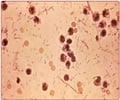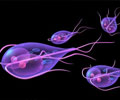American scientists have moved one step closer to realising an effective treatment for the stomach flu that can cause nausea, vomiting, and diarrhoea.
An effective treatment for the stomach flu that can cause nausea, vomiting, and diarrhoea has been identified by American scientists.
Experts at Washington University School of Medicine in St. Louis say that they have identified the primary immune sensor - a protein called MDA-5 - that detects the presence of such contagious viruses in the body as cause for this incurable condition.Doctors generally advise patients afflicted by stomach flu to drink lots of fluids, and let the virus run its course.
The researchers say that the identification of MDA-5 may enable the development of a treatment that prevents or reduces the infection, as this gene triggers an immune response that revs up the body’s defences to fight off the infection.
Describing their findings in the journal PLoS Pathogens, the researchers highlight the fact that the stomach flu is not the flu in real sense, and that it only affects the respiratory tract.
Medically known as norovirus, say the researchers, its outbreaks are common in locations where people live close together - such as cruise ships, nursing homes, military bases and schools.
The group says that antibiotics are ineffective against it because they fight bacteria, not viruses.
Advertisement
Although the study was based on mice, the researchers believe that the same proteins may be responsible for the detection of norovirus infection in humans.
Advertisement
Given that the two proteins are key to the recognition of similar types of viral infections, the researchers believe that they may be important in detecting noroviruses too.
Stephen McCartney, a graduate student in Colonna’s lab who is also the lead author of the study, claims to be the first researcher to show that cells in the test tube that lack the MDA-5 protein do not mount an appropriate immune response against norovirus infection.
Moving a step further, the researchers studied two groups of mice - one group lacked the ability to produce MDA-5, while the other TLR3.
Both groups of mice were found to have a defective immune response against noroviruses, said the researchers.
Mice without MDA-5 had higher levels of norovirus in their bodies, and a defect in the ability to signal other immune cells to respond, they added.
The animals that lacked TLR3 also had a decreased response to norovirus infection, the researchers noted.
According to them, some people have common variations of the MDA-5 gene that could make them more susceptible to norovirus infection.
They note that a norovirus treatment could be especially helpful to people who are more prone to the infection.
Source-ANI
RAS/L











